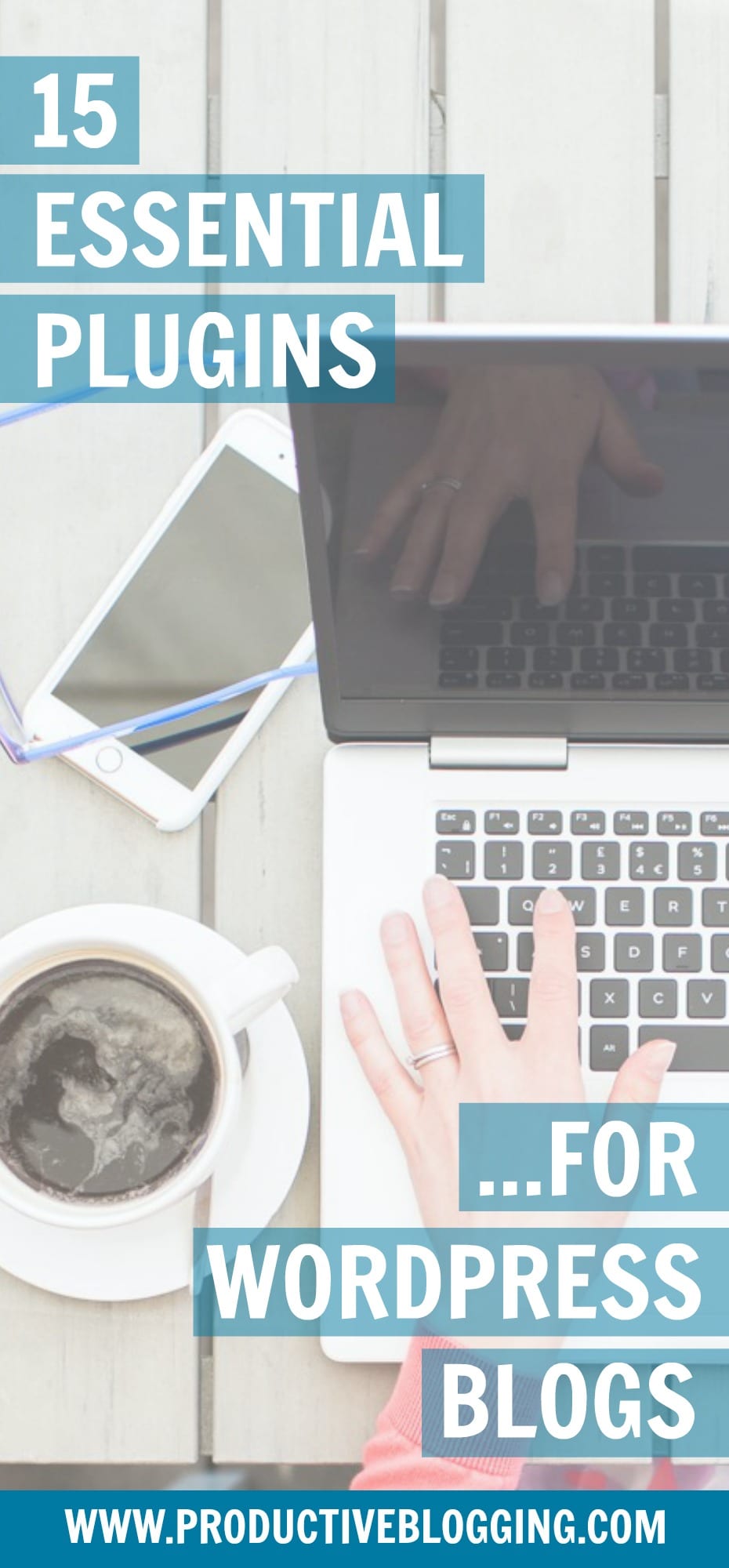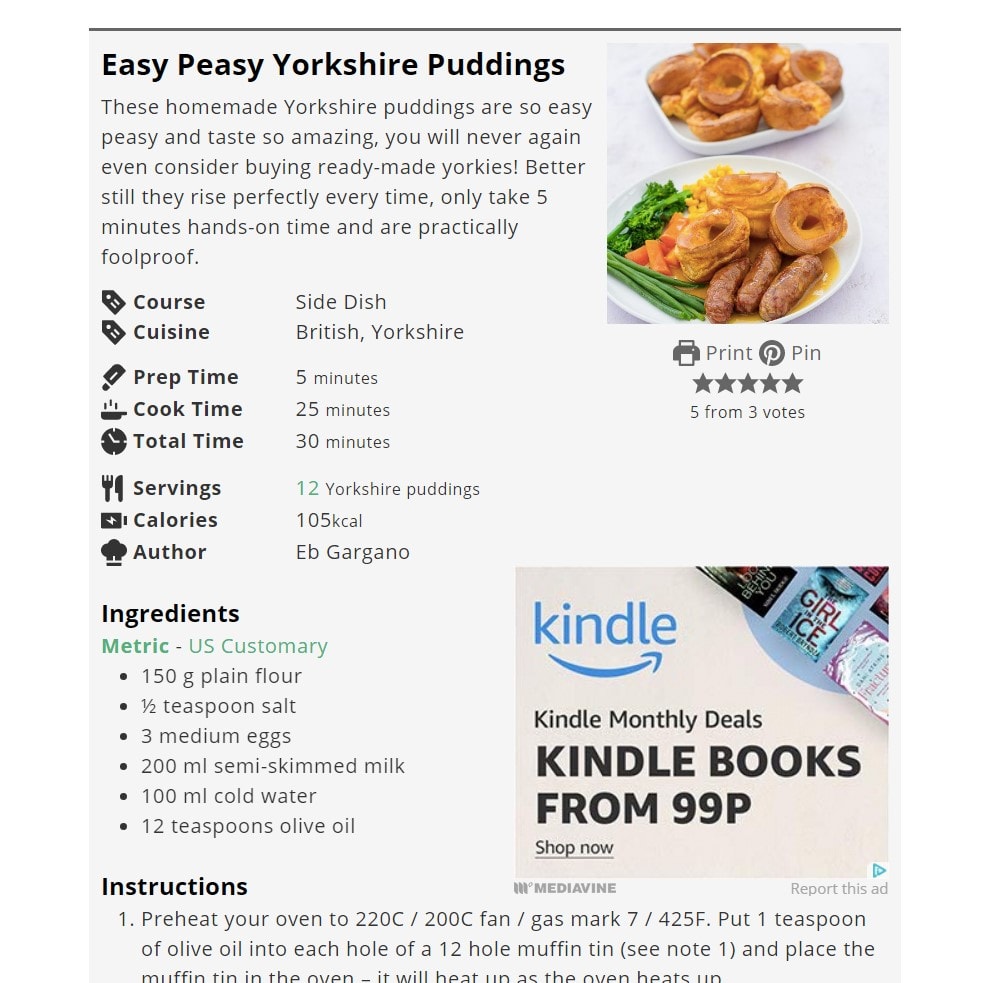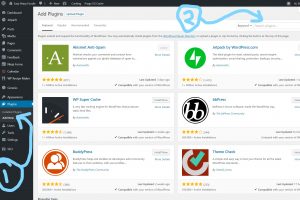15 essential plugins for WordPress blogs in 2024
I may get paid commission for purchases made after clicking a link in this post.
With so many great plugins out there, it can be difficult to decide which are really useful and necessary and which are not. Here’s my guide to the 15 essential plugins for WordPress blogs in 2024.
If you have a WordPress blog, you will probably be familiar with the term ‘plugin’, and probably have quite a few on your site. There are thousands of plugins available to WordPress bloggers and once you’ve figured out just how awesome they are, it’s rather tempting to go a bit mad and start collecting hundreds of them.
STOP!!!
Too many plugins can cause your site to be super slow and even cause security problems for your blog.
The trick with plugins is to just use the ones you really need. You want to keep in balance their fantastic awesomeness, with your need for a site that loads quickly (Why is site speed important? See my post on how to improve site speed for an explanation).
But with so many fab plugins it can be a little difficult to decide which ones are truly necessary and which ones are just a waste of time.
So to help you out, here’s my guide to the 15 essential plugins for WordPress blogs…
1. Akismet (FREE)
Akismet is all about protecting your comments section from spam and saving you time. If Akismet suspects a comment is spam it will put it in a separate section of your comments for you to review first.
Depending on how you have things set up in SETTINGS >>> DISCUSSION, comments will go into one section for approval and a separate section if Akismet thinks they are spam. That way you don’t need to sift through reams and reams of spam to moderate the ‘real’ comments.
Alternatively, if you have comment moderation turned off in your discussion settings, it means your comments won’t be littered with spam.
Akismet is usually pretty accurate (only very occasionally do I get a comment landing in the wrong place) and I make it a habit to go into the spam section regularly and delete anything unwanted and release anything the spam filter accidentally trapped.
2. All In One Security (FREE)
You need a security plugin on your website. A good security plugin will prevent your blog from getting hacked! There are a number of good ones around (I’ve heard good things about Sucuri and WordFence, for example), but All In One WP Security (AIOS) is the one I use and recommend. It’s pretty straightforward to set up, even for a non-techie like me and it has a number of useful features, such as the ability to change your login URL to something other that /wp-admin (so the hackers can’t find you), the ability to add extra security to your login process, and the ability to lock out a certain IP address if they try and fail to log in a certain number of times. (Just make sure you whitelist your own ip address so you don’t lock yourself out!)
READ MORE >>> 15 ways to protect your blog from hackers and other threats
3. ConvertKit (INCLUDED IN THE PRICE OF CONVERTKIT)
If you have ConvertKit*, this plugin is essential. It allows you to easily put email signup forms on your website and integrates with the ConvertKit app so that when someone signs up for your newsletter on your website, they are automatically added to your list of subscribers on your list. ConvertKit’s forms are attractive, super easy to use and can be placed almost anywhere on your site – giving you a better chance of attracting more subscribers to your list.
If you don’t have ConvertKit, chances are your email service provider will have a similar plugin.
READ MORE >>> A beginner’s guide to email marketing for bloggers + free challenge
READ MORE >>> 26 reasons why ConvertKit is the best email marketing service for bloggers
4. CoSchedule (INCLUDED IN THE PRICE OF COSCHEDULE)
If you have CoSchedule* then this plugin is essential as it allows you to link your WordPress website to your CoSchedule calendar, meaning seamless integration of your blog and social media.
Inside CoSchedule you can create and schedule a WordPress post, schedule all the social media associated with that post and have all the analytics together in one place. It will all show up on one calendar on both the CoSchedule App and your WordPress dashboard.
READ MORE >>> How to use CoSchedule to get more done in less time on your blog
READ MORE >>> How to schedule your social media with CoSchedule
READ MORE >>> How to automate your social media with CoSchedule ReQueue
5. COOKIE YES | GDPR Cookie Consent (FREE)
Having a cookies plugin is essential to ensure your blog stays legal. You must have a popup informing your readers that your blog uses cookies and asking them to accept.
Cookie Yes | GDPR Cookie Consent is the one I use on this site and I would really recommend it. It’s simple to set up, very easily adjusted and you can get it to match your brand colours. If you want to see what it looks like, just go into an incognito window and head to www.productiveblogging.com and you will see it pop up at the bottom of my site.
6. Health Check & Troubleshooting (FREE)
The Health Check & Troubleshooting plugin will perform a number of checks on your website to detect errors and problems, and will give you report on the overall health of your blog. But the best part of this plugin is that it will allow you to troubleshoot problems on your blog which you think might have been caused by a plugin or theme conflict, without affecting the experience your readers are having on the front end of your blog while you do it. You can use the Health Check & Troubleshooting plugin to disable all your plugins and then re-enable each plugin one by one to find out which plugin, or which combination of plugins is causing you a problem. You can also change the theme, to see if it’s your theme that’s causing the problems. And you can do all of this without affecting what your readers see!
7. ShortPixel (FREEmium)
One big thing that can speed your website up is image compression. Put simply, a photograph is a file containing lots of information, but only some of it is needed to see the picture properly. Image compression takes all the information you don’t need out of a photograph, while preserving enough information for the images to still look good to the naked eye.
There are lots of compression plugins you can use to reduce the file size of your images dramatically while still preserving great looking images. The one I use is ShortPixel*. This plugin is very easy to use, it will deal with all your existing photos in bulk as well as automatically optimizing the new images you upload going forwards.
8. WP Rocket (low cost)
Another thing that will dramatically improve your site speed and Core Web Vitals is using a site speed optimization plugin. The one I use and recommend is WP Rocket*. WP Rocket is widely considered to the best site speed optimization plugin available. It works well out of the box, but if you follow the tutorials on the WP Rocket website to fine tune things, you can make some significant site speed gains.
9. Pretty Links (FREE)
Not exactly ESSENTIAL but pretty awesome! Pretty Links will allow you to take any link (on your site or not) and turn it into a much more attractive link.
So say, for example, I set up a landing page to get people to sign up for my newsletter, Convertkit will give me a link to send people to. That link might look like this: https://productive-blogging.ck.page/c5ac1ce090
Not exactly attractive is it?
But using Pretty Links I can turn this into something much more attractive. In the above example I turned this landing page into: https://www.productiveblogging.com/blogplan
Go on try both links and see how amazing it is! No more ugly links, only pretty links!
Another great use for Pretty Links is to help you manage and track your affiliate links. Find out more about this here >>> How to manage, organize and track your affiliate links (without expensive software!)
10. Yoast SEO (FREE)
An SEO plugin is essential if you want your blog to rank well in Google’s search results. The most popular SEO plugin BY FAR, and the one I recommend is Yoast SEO. This powerful plugin does a lot more than most people realise. Everything from creating XML sitemaps and outputting structured data to adding self-referencing canonicals and automatically no-indexing pages you definitely DON’T want to appear in Google search results… and a whole lot more!
READ MORE >>> What does the Yoast SEO plugin actually do?
11. Yoast SEO Premium (low cost)
I hesitated over whether or not to include Yoast SEO Premium. Though not technically essential, it is jolly useful! Yoast SEO Premium offers everything that you get from the free plugin plus…
- Better keyword optimization
- AI generator for SEO titles and meta descriptions
- Social media previews
- Integrations with other SEO tools
- Internal linking suggestions
- Orphaned content tool
- Stale cornerstone content tool
- Content insights tool
- Redirects manager
- Focus keyword export
- Free access to the Yoast Academy
- Free access to 24/7 support
- Ad-free experience
Head here to take a look at those premium features in detail >>> Is Yoast SEO Premium worth paying for?
12. Simple Social Icons (FREE)
Another essential to have on your blog is a way of directing people to your social media profiles so they can follow you on social media too. As the name suggests Simple Social Icons is a very simple plugin that will allow you to create attractive links to your social media profiles to put in your sidebar. Simple Social Icons also makes it very easy to customise the colours, sizes, backgrounds and borders to match your branding.
You can see an example in my sidebar (Where it says ‘Let’s Connect’, just under my ‘About Me’ section).
13. Social Warfare (FREEmium)
A social sharing plugin is definitely essential, as it allows your readers to share your blog posts with their friends and followers via their social media accounts. There are many social sharing plugins, but Social Warfare is the one I use on this blog and recommend. The basic account is free and there is also a premium version. Whilst the premium version does have some great features, the free version is very good in its own right.
The free version gives you sharing buttons for Facebook, Twitter, Pinterest and LinkedIn. You can choose where in the post they appear (above, below, both or anywhere within your post). It gives you various options for share counts and total counts, and it gives you the option for floating sharing buttons too, so the sharing buttons are always in view.
The premium version of Social Warfare* is currently $29 per year and has all the above features plus additional sharing options (e.g. Reddit, Tumbler, Buffer, Email etc.), Twitter tweet counts, an image hover pin button, the option to select a particular image and/or text for social shares. It also offers different button colours and shapes, different ‘click to tweet’ styles and recovery of lost share counts (for example if you’ve gone from HTTP to HTTPS), and loads more stuff besides – personally I think all that’s well worth it for $29. But the free version is still good if you decide not to upgrade.
Another really good social sharing plugin is Hubbub (Formerly Grow Social Pro). I use Hubbub on my food blog, Easy Peasy Foodie. Hubbub is currently $34 per year and has very similar features to Social Warfare Premium.
14. VaultPress (low cost)
Having an offsite backup is a BIG essential. I’ve tried a few backups but VaultPress is by far the best one I’ve used. It’s run by the same people who run WordPress.com, Akismet and Jetpack, so you know you can trust it. This plugin will do a backup of your site every day. This gives you peace of mind that if the worst should happen to your blog, you can always restore a backup and the most you will have lost is the last 24 hours. For less than the price of a takeaway coffee PER MONTH, I’d say that was worth it! Head over to the VaultPress website* to get this one.
15. WP Recipe Maker (FREEmium)
(For food blogs only) Having a recipe card plugin is essential if you plan to share recipes on your website. WP Recipe Maker* is the one I recommend and the one I use on my food blog, www.easypeasyfoodie.com.
There is a free version and a premium version with more bells and whistles. But to be honest the free version is incredibly good. The main advantage of the premium version is you get help calculating the nutrition information and a unit conversion option (great if you are a Brit trying to reach an American audience or vice versa).
Having a good recipe plugin is vital for SEO and is also super useful for your readers. Do include all the required information, as this will help your recipe perform best on search engines (and of course help your readers out the best too).
How to install a plugin…
Just in case you are a little hazy, here is a quick guide to help you install plugins…
To install a plugin on your site is very simple. Find the PLUGINS section down the left-hand side of your dashboard and hover over it. Choose ADD NEW and you’ll be taken to this screen…
Use the search box on the right-hand side to search by name for the plugin you have chosen. Then click on the grey INSTALL NOW, then ACTIVATE. You will usually be taken to a screen where it shows you how to set up the plugin. Set up the plugin how you want it and you are good to go.
Don’t forget to update!
It’s vitally important that you always remember to update your plugins. Updating plugins protects your site, fixes bugs, ensures everything is compatible and adds features and functionality. I make it a habit to go in and update my plugins once a week. One word of warning though: every now and again an update is released that causes problems. I always allow at least 1 week from when a plugin is released to when I update, just to ensure that any issues are ironed out!
Self-Hosted WordPress
All of this post about plugins assumes you have a Self-Hosted WordPress site. If you do not, I really recommend that you look into transferring to Self-Hosted WordPress as it will serve you better in the long run and give you access to all these amazing plugins and more.
For an explanation of the difference between self-hosted and hosted and how to decide which one is better, check out this post: Hosted vs self-hosted: which is best for your blog?
For help in actually setting up a self-hosted WordPress blog, check out this post: How to start a successful WordPress blog – a step by step guide
I’d love to hear your thoughts!
Which are your favourite plugins and why? Is there anything you feel I should definitely have included on my list?
- 61 things I wish had known before I started blogging
- 9 essential things to do before starting a blog
- What is a blog and how does it work? Blogging explained!
- How to start a PROFITABLE blog in 2024
- How to get your website on the first page of Google
Don’t miss a thing!
Follow me on Twitter, Facebook and Instagram. Or why not subscribe to Productive Blogging and get blogging and productivity tips straight to your inbox every week?
Pin this post to read later
*This blog post contains affiliate links, this means if you click on a link and go on to buy the product I recommend, I will get a small commission, but you will not be charged a penny more – thanks in advance!









Interesting post Eb, I’m pleased to say I have most of these but not Jetpack…yet! For some reason because I was on wordpress.org I had issues with downloading it. On the flip side, are there any plug-ins you’d suggest avoiding and out of interest how many do you have in total. I’m a hardcore minimalist and can’t stand clutter so if I can reduce my plug-ins further to speed up my site I would!
Thanks Rebecca, that’s odd that you should have issues downloading Jetpack. Although maybe that was something related to your previous host and being on a managed plan??? See if you can do it now you are on SiteGround – and if not ask in their chat. I think my answer to your question is ‘anything you really don’t need’. Ask yourself the question: ‘do I REALLY need this?’ and if the answer is no, hit DELETE. Also anything which seems a bit dodgy and/or you don’t really know where it comes from, or if it has lots of negative reviews. You really don’t want dodgy plugins. Like you I am a minimalist. This list isn’t just what I recommend as essential plugins, this is ALL the plugins I use. If it’s not essential, it’s not needed!! Eb x
Wicked list – cheers Eb, I just worked my way through the list – got myself nearly all of them!
Yay – I’m so pleased you found it helpful – I’m looking forward to hearing more about your new blogging ventures… and seeing them come to life! Eb x
Thank you for making this list Eb! We’re moving our blogspot blog over to WordPress so naturally I wanted to make sure I had all the right plugins. Thank you so much! I’m surprised you didn’t include a plugin for Google Analytics, unless somehow Yoast can take care of this. Thoughts on having a caching plugin like W3 Total Cache?
A pleasure, Adam. I’m so pleased you found it helpful. I didn’t include a plugin for GA as, depending on your theme, you can often easily add the tracking code into your theme settings – you can find out more about that in this post >>> https://www.productiveblogging.com/set-up-google-analytics-wordpress-blog/ When it comes to caching, if you are with SiteGround, SiteGround have built in caching settings in their SG Optimiser plugin. That’s all I have for my site. Hope that helps! Eb 🙂
Great post, Eb! I just came across your blog and find it very useful.
I am about to launch my blog ( currently on maintenance mode ) and trying to do the last-minute checklist and avoid making too many mistakes. My blog is hosted by Siteground and I have a few questions for you. Do I still need a Vaulpress plug-in if Siteground is already doing daily backups? Also, I have a jetpack plug-in installed, isn’t that to help to protect your site or I still need to have an all-in-one WP Security & Firewall plug-in? I am completely new to this and your help would be very appreciated. Thank you!
Oooh exciting! Ok, so… it’s great that SiteGround do daily backups, but yes I would still get VaultPress. It’s unlikely, but possible that something could go wrong at SiteGround (like a fire or a major hack or something – unlikely, but still possible!) Then you’d lose your blog AND your backup. That’s why I always advise having a second backup done by someone completely different – and VaultPress is the best I’ve found.. All-in-One Security does a lot more than Jetpack, so yes, I would definitely have that too. Hope that helps and good luck with your new blog! Eb 🙂
Very useful post! Which GDPR consent plugin do you use as there are so many to choose from?
Thank you! I use this one >>> https://wordpress.org/plugins/cookie-law-info/